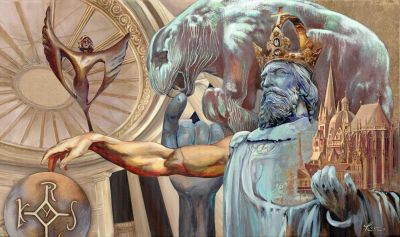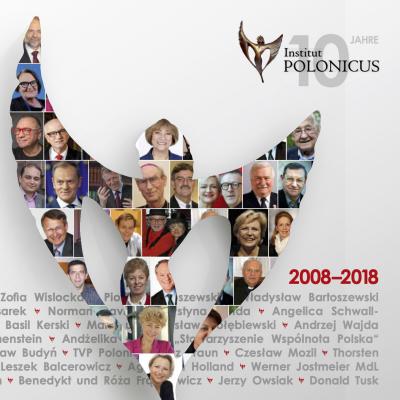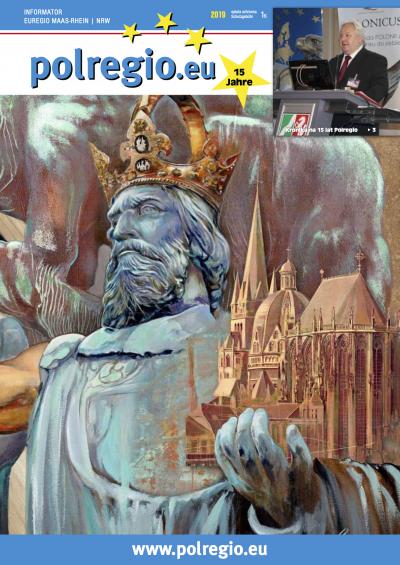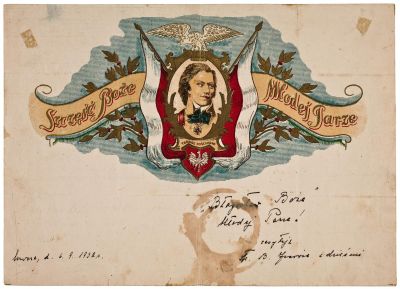Polonicus – the prize of the European Polonia

The history of Polish emigration dates back centuries. Today, 18 to 20 million Poles and people of Polish origin live outside their homeland, two million of them alone live in Germany. Whilst many countries crown their “Pole of the Year“, until 2009, the year the first Polonicus prize was awarded in Aachen, no prize existed that Poles living abroad had created for Poles living abroad.
The Polonicus prize is awarded by the European Polonia, which is represented by the institute of the same name and by a jury comprising the Chair of the Polonicus Institute, a member of the Senate of the Republic of Poland [Translator’s note: Also referred to as Senator] and representatives of Polish organisations abroad that belong to the European Association of Polish Communities (Europejska Unia Wspólnot Polonijnych, ( EUWP)). Prize winners can be people who live or work in the European Union and who are citizens of an EU member state. The jury awards its accolade each year in the following categories: Culture − to creative artists or other persons who advocate for the Polish or the European culture; Polish Organisations; German-Polish Dialogue − to persons who contribute to the development of the German-Polish cooperation and of the German-Polish dialogue and the understanding of both nations. There is also the honorary award category which sporadically honours lifetime achievements. The recipients of the awards are announced in February. The award ceremony is then held at the end of April or the beginning of May in a remarkable place in the city of Charlemagne the Great: the Coronation Hall of Aachen Town Hall, which has represented the might of the Holy Roman Emperor for 790 years because it was here that 30 rulers of the Empire received their insignia. Initially, Dr Marek Prawda, the Ambassador of the Republic of Poland, assumed the honorary patronage of the Polonicus prize. He was later followed in this role by the Marshall of the Sejm, Bogdan Borusewicz. From its very beginning, the award has also been supported by the experienced and committed senator of the Republic of Poland, Ms Barbara Borys-Damięcka.
Since then, 44 outstanding personalities from the political, social and cultural life in Poland, Germany and Europe have received this extraordinary European prize. In 2014, the Poles living abroad in Western Europe, who always think about the Poles living abroad in Eastern Europe, awarded the Polonicus prize to Ms Andżelika Borys, the Chair of the Union of Poles in Belarus, a country that is currently fighting for the reinstatement of democratic elections. The prizewinners to date have included Europeans from Belgium, Denmark, the Netherlands and Great Britain. When the British historian Professor Norman Davies, whose key area of work was the history of Poland, accepted the prize in 2011, he highlighted the fact that Copernicus had been an important scientist who was both a German and a Pole. At the end of his speech he said: “The Poles should be proud of their national heritage. The Germans should be proud that so many Poles have chosen their country in which to live and work. I am proud that, from today, I am a Polonicus.”
Many outstanding politicians belong to the circle of German prizewinners who have advocated for a deepening of the German-Polish understanding. These include Dr Angelica Schwall-Düren, the Minister for Federal Affairs, Europe and Media of the Land of North Rhine-Westphalia; Professor Rita Süssmuth, President of the German Federal Parliament (retired); Professor Gesine Schwann, the former Rector of the European University Viadrina in Frankfurt an der Oder and the Federal Government’s Poland Commissioner; Thorsten Klute, Secretary of State in the Ministry for Employment, Integration and Social Affairs of the Land of North Rhine-Westphalia; Marcel Philipp, the mayor of the City of Aachen and Olaf Müller, the head of the Cultural Office of the City of Aachen, who has actively supported the award ceremony gala in its preparations since 2009.
The Polish Polonicus prizewinners also include renowned European politicians, such as the historian and publicist Professor Władysław Bartoszewski, who “opened our eyes to Europe. Without him, much of what happens in German-Polish relationships would not be possible or would not exist at all,” as Dr Marek Prawda, the former Ambassador of the Republic of Poland and currently Head of the Delegation of the European Commission in Warsaw, highlighted in his laudation, but this also includes Donald Tusk, the former Prime Minister of the Republic of Poland and President of the European Council, and Professor Jerzy Buzek, who was President of the European Parliament from 2010 to 2012 and who spoke about his enthusiasm for Europe in his acceptance speech: “The most important thing in the world is that we are in a position to unite. We are building a European Community. This community is characterised by the fact that we speak 23 languages. We value multilingualism, we appreciate the variety, we want to unite in diversity. The Polonia plays a very important role in this because she is represented throughout the entire European Union. Polonia unifies, she is able to act jointly. That means that, for us, the ‘Promised Land’ of which the Poles dreamt is now everywhere, everywhere in Europe, and that our dreams of a life in freedom are being fulfilled. These were the dreams of Solidarność”.
Those honoured in Aachen also include the Nobel Peace Prize winner Lech Wałęsa, the former union activist and President of the Republic of Poland, who had made an appeal in the Coronation Hall of Aachen Town Hall in 2017: “Germany is the greatest power in Europe and I would like it to assume the responsibility for Europe, and if anyone, Poland, Hungary or anyone else, breaks up the Union I would like you, as a leading force, to have finalised solutions ready and to found a new union five minutes after the end of the Union.” Recipients of the Polonicus prize, however, also included representatives of the church, such as Archbishop Professor Alfons Nossol and Pastor Stanisław Budyn, the Rector of the Polish Catholic Mission (Polska Misja Katolicka) in Germany, as well as linguists, such as Professor Władysław Miodunka from the Jagiellonian University in Kraków and Professor Jan Miodek from the University in Wrocław.
Furthermore, outstanding creative artists, such as Krystyna Janda, the first lady of Polish theatre and film, Andrzej Wajda, as director and Oscar winner for his lifetime achievement and Agnieszka Holland, the director and winner of the Silver Bear at the Berlinale, also belong to the Polonicus family. At the time, the award was accepted by her daughter Kasia Adamik in Aachen. She read out a letter from the award-winning Polish artist which stated: “Polish culture owes its greatness to the variety, the openness, the quest for truth, justice and ultimately for freedom. Culture is always controversial, vibrant, creative and free of political and partisan pressure.”
Wiesław Lewicki, the Director of the European Institute for Culture and Media Polonicus VoG (Europejski Instytut Kultury i Mediów Polonicus VoG) and spiritus movens of the Polonicus prize, who has organised the unique event for the last eleven years, tries every year to relate the award ceremony to International Polonia day, which is held in Poland on 2 May every year. In all this, however, it is not just the time of the Polonicus celebrations that is special but also the place in which they are held, this being the City of Aachen in the border triangle of Germany, Holland and Belgium, which was the seat of Emperor Charlemagne the Great around the turn of the 8th and 9th century and which today is still considered the stronghold of European integration. But the Coronation Hall in Aachen Town Hall is also legendary for Poles because it is here that Pope John Paul II, Bronisław Geremek and Donald Tusk were awarded the International Charlemagne Prize, which is also awarded annually, for their outstanding contribution to peace and unity in Europe. Today the Polonicus prize is a prestigious token of the European Polonia, which is dedicated to the European dialogue, the unification process and the achievements of Poles in the world. It has found its place in the calendar of important events in Europe. The Polonicus prize is needed by Poles at home and abroad to give ourselves the respect we deserve wherever we live.
Agata Lewandowski, August 2020




